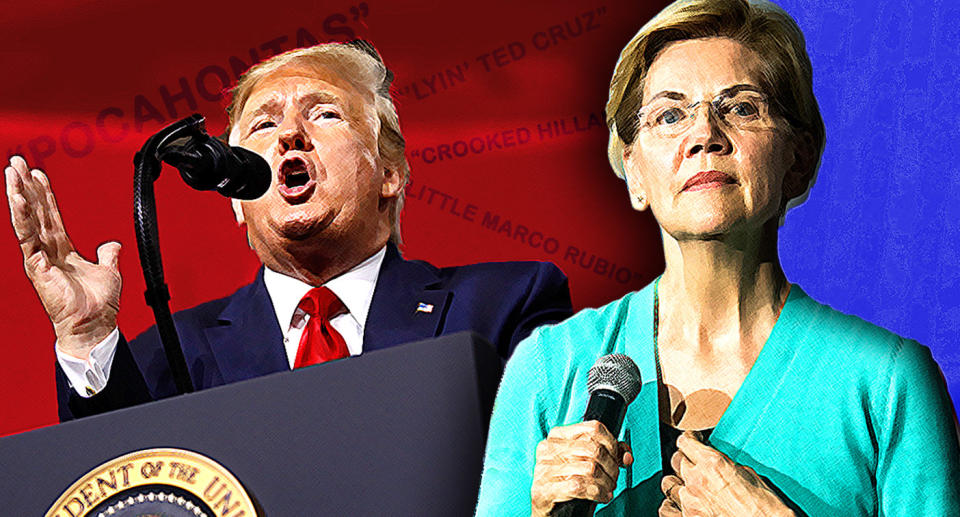Trump threatens Warren with death by 'Pocahontas,' again
- Oops!Something went wrong.Please try again later.
- Oops!Something went wrong.Please try again later.
Donald Trump, according to observers who have studied him closely, is not much given to deep reflection, self-analysis, second thoughts or doubts about his own genius. But in a revealing moment during last week’s rally in Manchester, N.H., he uncharacteristically suggested that he might have made a mistake early in the year by prematurely deploying his strongest weapon against Sen. Elizabeth Warren: the insult nickname “Pocahontas.”
“I did the Pocahontas thing. I hit her really hard and it looked like she was down and out, but that was too long ago.
“I should have waited, but don't worry, we will revive it. It can be revived. It can be — right? It will be revived and it can be revived very easily and very quickly and we're going to have some fun in the state of New Hampshire.”
On Monday, Warren, appearing at the Native American Presidential Forum in Sioux City, Iowa, gave a well-received apology for her earlier claims to Cherokee descent, based on family legend.

Trump was taking note of Warren’s steady climb in the polls after a disappointing start to her campaign, displacing Bernie Sanders as the runner-up to Joe Biden in some recent results. Along with Biden, Sanders and Kamala Harris, she is beating Trump in a head-to-head matchup in a poll by Fox News, a cause of considerable annoyance to the president. To take Trump at his word, he seems to think that it was his mockery that caused Warren’s early troubles — rather than her own miscalculation in releasing a DNA test result showing a minuscule trace of Native American ancestry — and to believe that he can replicate the result at will, with a flick of a finger on his iPhone.
This says a couple of things about Trump. One is his well-known propensity for insults, and his unique belief in their efficacy as a political tool. The other is how he fashions his peculiarly intimate relationship with his audience, by recruiting them to his cynical, nihilistic worldview.
It’s still remarkable to look back on how Trump effectively built his campaign, and his governing style, around insults, both to entire nationalities and individual rivals, including “Little Marco Rubio” and “Low-Energy Jeb Bush.” Nearly a year before the 2016 election, the New York Times analyzed more than 4,000 tweets he had sent in the six months since he had entered the race, and “of those, we found that one in every eight was a personal insult of some kind,” the newspaper wrote.
A tiny sampling of his terms of invective include “dummy” (Ohio Gov. John Kasich), “a lightweight” (Rubio), “wacky” (Glenn Beck), “clowns” (the staff of Politico), “highly neurotic” (Rep. Debbie Wasserman Schultz), “grubby” (Vanity Fair editor Graydon Carter) and “very racist” (Warren, who was awarded a second-string insult — “goofy” — in the same tweet).

It’s hard to argue with success, and it worked for Trump, at least in 2016. It has the benefit of encapsulating in a single word, and reinforcing by repetition, whatever negative attribute he is highlighting in a rival: the duplicity of “Lyin’ Ted Cruz,” the venality of “Crooked Hillary” Clinton. Insults are a bonding ritual with his audience, the excuse for a communal jeer that is the highlight of every Trump rally (“Lock her up!”) with Orwellian echoes.
But with enough repetition, the barb loses its sting, as he seemed to sense about “Pocahontas.” And sometimes the insults are so obscure, irrelevant or generic — did he expect voters to reject “Little Marco Rubio” because of his height, or Carly Fiorina because of her looks? — that they seem to express less a coherent strategy than his personal need to dominate. Trump exemplifies the saying that it’s not enough to win; others have to lose. And not merely lose, but feel bad about it. And if they don’t feel bad enough, he’ll rub it in by calling them “losers,” one of the favorite slurs in his lexicon.
But there was something else going on in that speech, a less-appreciated aspect of Trump’s political instincts: his willingness to let the audience in on the joke. Most politicians have a well-deserved fear of appearing calculating or manipulative; whatever their particular ideology, their shared brand is “authenticity.” It’s one reason they preface even the most anodyne statement with “frankly”: “Frankly, Chuck, I care very much about the middle class.”
But Trump seems largely immune to that impulse. In preposterously insisting throughout his campaign that “Mexico will pay for the wall,” Trump was signaling both that plausibility was irrelevant to his program, and that meaning was irrelevant to his speech. If you were gullible enough to believe that he could talk Mexico into doing something so pointless and idiotically self-destructive, he would happily accept your vote. But surely most in the crowd understood it as a shibboleth, an empty phrase that served to bind his supporters together and to him. When voters said they found him “authentic,” they meant the opposite of “sincere”: so transparently manipulative that it was impossible to accuse him of artifice.
And so when he announced that he would vanquish Warren a second time with the magic incantation of “Pocahontas,” the crowd thrilled to this peek behind the curtain of earnestness that shrouds every normal campaign. Having turned presidential campaigning, and governing, into a long-running joke, Trump was letting his audience in on it. Next year will show whether it’s as funny the second time around.
_____
Download the Yahoo News app to customize your experience.
Read more from Yahoo News:



